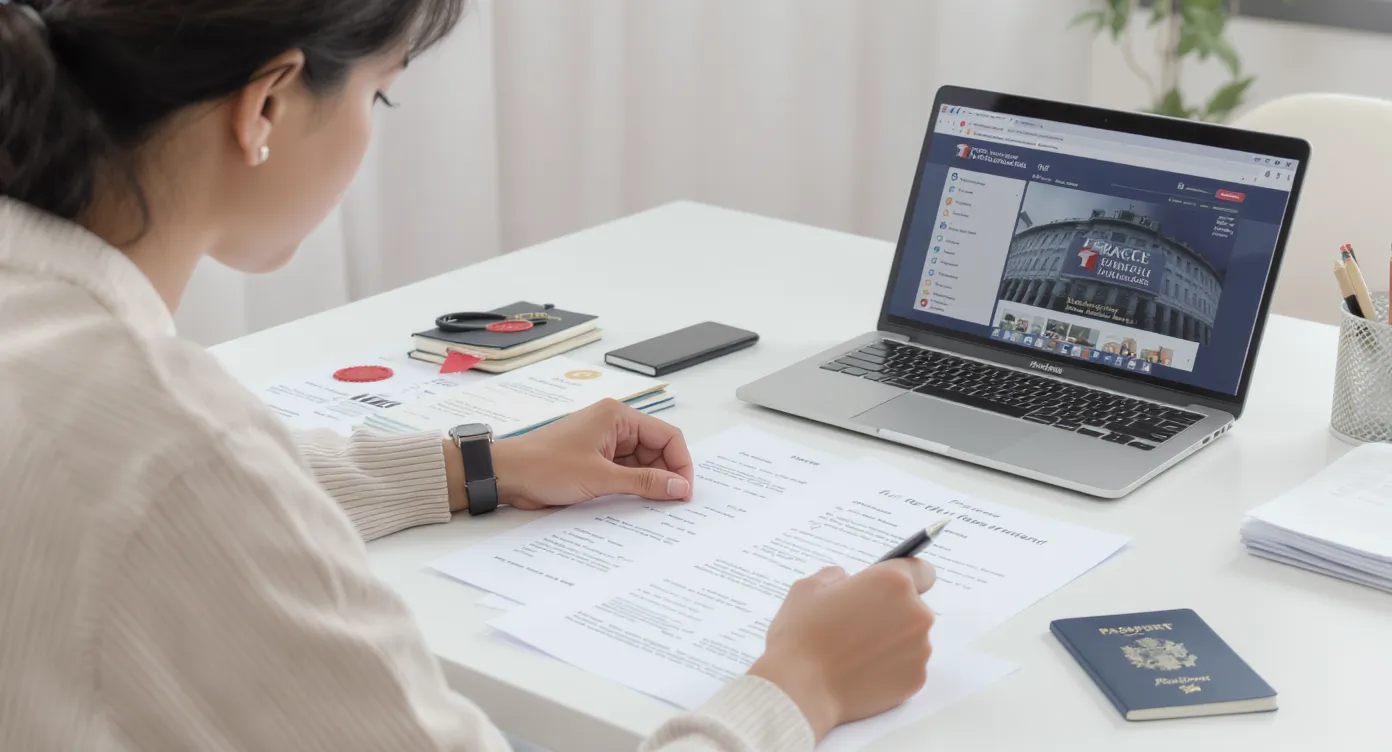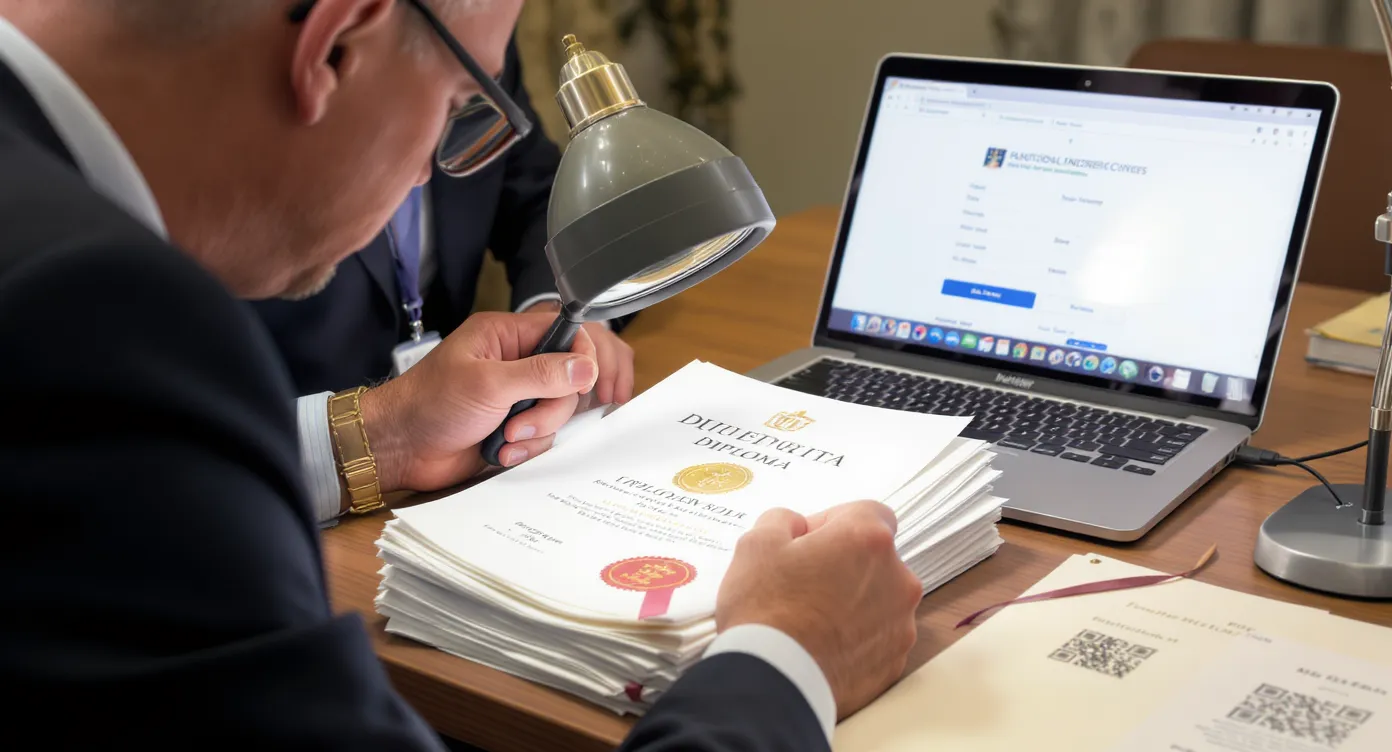Understanding the Anti-Fraud Checks on Foreign Diplomas

Foreigners arriving in France with an impressive academic record quickly discover that a diploma is more than a line on your CV – it is a core piece of evidence in almost every immigration procedure. Whether you are applying for a Talent Passport, converting a student visa into a work permit, or building a naturalisation file, prefectures and consulates will scrutinise your qualifications. Since a 2023 Cour des comptes report estimated that forged education documents appear in 7–10 % of immigration files, France has ramped up systematic anti-fraud checks. Understanding how those controls work – and how to prepare – can mean the difference between an approval and an OQTF removal order.
1. Why France Checks Foreign Diplomas
- Immigration compliance – Articles L.313-20 and L.421-13 of CESEDA require proof of the degree claimed for several residence-permit categories.
- Labour-market protection – The Labour Code obliges DREETS to verify that regulated professions (health, engineering, aviation, teaching) hold genuine credentials.
- Public-fund stewardship – Scholarships, tax breaks and training grants hinge on authentic academic records.
Put simply, forged diplomas distort labour statistics, undercut local graduates and expose employers to heavy penalties. (See our guide on Employer sanctions for hiring undocumented workers for details.)
2. Legal Framework and Main Actors
| Authority | Legal tool | Typical role |
|---|---|---|
| Consulates / France-Visas | Decree n° 2015-364 | Pre-visa document screening and interview cross-checks |
| ENIC-NARIC France (France Éducation International) | Decree n° 2002-590 | Issues attestations de comparabilité and maintains diploma database |
| Prefectures (Immigration desks) | CESEDA art. R.431-4 | Verify originals at appointments, order forensic exams |
| DREETS Labour Inspectorate | Labour Code L.5221-5 | Validates qualifications for work-permit requests |
| Prosecutors & Police (OCLTI) | Penal Code art. 441-1 | Investigate and prosecute forgery or use of forged documents |
3. How Anti-Fraud Checks Are Performed in 2025

Tier-1 automated screening
- Optical character recognition flags altered fonts or pixel breaks.
- Metadata comparison detects date or number sequencing anomalies.
- Database calls to ENIC-NARIC identify black-listed institutions (so-called “diploma mills”).
Tier-2 forensic analysis
- UV light for watermarks and security threads.
- Spectrographic ink tests on stamps and signatures.
- Comparison with verified specimen samples from the issuing country’s Ministry of Education.
Tier-3 issuer confirmation
- Direct e-mail or postal query to the registrar’s office.
- Secure blockchain or QR-code verification where available (China CHSI, India NAD, many EU countries via Europass).
Tier-4 joint investigation
- OCLTI (Office central de lutte contre la traite des êtres humains et l’immigration irrégulière) may open a criminal probe when organised fraud is suspected.
4. Red Flags That Trigger Deeper Scrutiny
- Diplomas from private institutions lacking national accreditation lists.
- Discrepancies between diploma date and entry/exit stamps in passport.
- Grades, majors or campus names that do not match the institution’s curriculum for the relevant year.
- Plastic-card diplomas or .docx editable copies instead of secure paper originals.
- Generic translations without sworn translator details.
5. Consequences of Submitting a Fake or Unverifiable Diploma
- Immigration refusal – Prefectures can deny the residence-permit request and issue an Obligation de Quitter le Territoire Français. Our article OQTF explained outlines the tight appeal deadlines.
- Criminal exposure – Forgery or use of forged documents carries up to three years in prison and a €45,000 fine under Penal Code 441-1.
- Employer liability – Hiring an unqualified foreign worker can cost companies €60,000 per employee plus a five-year ban on public contracts.
- Blacklisting – Your details may be flagged in the VIS Schengen database, complicating any future visa attempt.
6. Protecting Your File: A Step-by-Step Checklist
| Step | Recommended action | Why it matters |
|---|---|---|
| 1 | Order an official duplicate diploma and full transcripts from the issuing university registrar. | Originals are often required; duplicates show raised seals and security paper. |
| 2 | Obtain an apostille or consular legalisation of each document. | French authorities can instantly verify the signature via the Hague e-Register. |
| 3 | Secure an ENIC-NARIC comparability certificate (attestation de comparabilité). | Adds an official QR code that prefectures trust and speeds up checks. |
| 4 | Use a sworn translator (traducteur assermenté) registered with a French court. | Prefectures reject amateur or AI translations. |
| 5 | Keep document provenance proof (courier receipts, registrar emails). | Shows chain of custody if authenticity is questioned. |
| 6 | Upload scans in PDF /A format via the ANEF portal – no screenshots. | Reduces file-corruption flags during automated OCR. |
| 7 | Prepare a cover letter summarising the verification steps you followed. | Helps overworked agents process your file faster. |
Tip for Students Graduating Soon
If your physical diploma will not be ready before a visa renewal, request a provisional certificate of completion (often called attestation de réussite) bearing the same security features. Attach proof of tuition payments and course lists.
7. What if Your Diploma Cannot Be Verified?
- Ask the institution for secure digital credentials: more universities now issue blockchain-signed copies that bypass postal delays.
- Provide alternative evidence: notarised transcripts, faculty reference letters, online graduation listings archived with wayback timestamps.
- File a sworn statement of loss if the original was destroyed, then request a replacement via the Ministry of Education in the issuing country.
- Seek legal advice early: prefectures rarely grant extra time once a procedural timeline starts.
8. How ImmiFrance Can Help
Navigating anti-fraud controls alone can be daunting, especially when language barriers and tight prefecture slots add stress. ImmiFrance’s diploma-verification package includes:
- Pre-check of scans to spot red flags before you submit.
- Guidance on securing apostilles or legalisation in over 40 countries.
- Fast-track ENIC-NARIC application assembly and sworn-translator matching.
- Real-time dossier tracking through your personal dashboard.
- Referral to a specialised immigration lawyer if a fraud allegation already exists.
Book a 20-minute eligibility call or learn more on our service page.
Frequently Asked Questions
Do I always need an ENIC-NARIC certificate? Not for every visa, but it drastically shortens prefecture processing and is mandatory for regulated professions.
Will a simple notarisation in my home country suffice? No. Unless your country is outside the Hague Convention and France has bilateral recognition, a notarisation alone is insufficient – you need consular legalisation instead.
How long do diploma checks take? Automated screening is instant, but direct university confirmation can add 2–6 weeks. Factor that into your renewal timeline.
Is a photocopy acceptable if my original is with a recruiter? Prefectures demand originals on the day of the appointment. Provide a courier-tracking receipt proving the recruiter will return it and bring certified copies in the meantime.
Can a suspected fake be appealed? Yes. You can request an independent expert exam and challenge the prefecture decision before the administrative tribunal, but deadlines are as short as 30 days.
Ready to Secure Your Future in France?
Don’t let paperwork doubts derail your plans. ImmiFrance has helped thousands of applicants sail through document verification with a 92 % success rate. Upload your diploma scans today for a free preliminary audit and move one step closer to your French dream.
